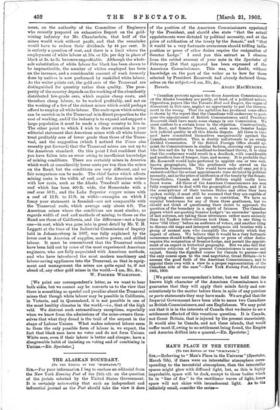THE ALASKAN BOUNDARY.
[To THE EDITOR OF THE "SPECTATOR.1 Sin —For your information I beg to enclose an editorial from the New York Evening Post of the 24th ult. on the question of the jurists selected by the United States Government. It is certainly noteworthy that such an independent and influential journal as the Post should take the view it does of the position of the American Commissioners appointed' by - the President, and should also state " that the actual appointments were dictated by political necessity, and at the price of ratification of the treaty by the Senate," and "that it would be a very fortunate occurrence should trifling indis- position or press of other duties require the resignation of Senator Lodge." I send you this extract as I observe from the cabled account of your note in the Spectator of February 21st that approval has been expressed of the American Commissioners. This was, no doubt, without knowledge on the part of the writer as to how far those selected by President Roosevelt had already declared them. selves on the subject.—I am, Sir, &c., " Canadian protests against the three American Commissioners on the Alaska boundary are partly, at least, of a political nature. Opposition papers like the Toronto Mail and Empire, the organ of discontent in this case, neglect no opportunity to put the Govern- ment in the wrong. That the agitation has produced some effect is shown by the report that the Canadians will endeavour to post- pone the appointment of British Commissioners until President Roosevelt shall have made some change in our Commission. We must confess to a certain force in the objection. Constructively, Mr. Root, and Senator Turner, and, even more, Senator Lodge lack judicial quality in all this Alaska dispute. All three in time past have committed themselves unequivocally against the Canadian contention. This is doubly unfortunate in an evenly divided Commission. If the British Foreign Office should ap- point its Commissioners in similar fashion, choosing only persons who live and die by the headland-to-headland theory, it is clear that the conference would result in a deadlock, with considerable and needless loss of temper, time, and money. It is probable that Mr. Roosevelt would have preferred to appoint one or two well. known geographers, like the gentlemen who served on the Venezuela Commission. This would have made all easy, yet it is understood that the actual appointments were dictated by political necessity, and as the price of ratification of the treaty by the Senate. Nevertheless, Canada and Great Britain might easily have fared worse. All three of the American Commissioners are men fully competent to deal with the geograplical problem, and if in the semi-privacy of their various States and cities they have spoken rashly, it must still be assumed that they are capable of weighing evidence and are open to conviction. We have no especial tenderness for any of these three gentlemen, but we should not think of questioning their desire to approach the question of the boundary in a spirit of fairness. The Canadian papers which are quoting Senator Lodge's no surrender' speeches of last autumn, are taking these utterances rather more seriously than his Yankee fellow-citizens took them. It is one thing to wave Old Glory' before an audience of voters, and another thing to discuss old maps and interpret ambiguous old treaties with a group of earnest men who exemplify the sincerity which they expect of others. We believe that it would be a very fortunate occurrence should trifling indisposition or press of other duties require the resignation of Senator Lodge, and permit the appoint- ment of an expert in historical geography. But we also feel that excessive criticism of the present Commissioners is unwise and unjust. Surely the dignified course for Canada to pursue—and the only course open to the real negotiator, Great Britain—is to assume the good faith of the American Commissioners, and to appoint their own with a view to a proper representation of the Canadian side of the case."—New York Evening Post, February 24th, 1903.
[We print our correspondent's letter, but we hold that the known high character of the American Commissioners is a guarantee that they will apply their minds fairly and con- scientiously to the matter before them in spite of any previous ex parte statements they may have made. We are glad that the Imperial Government have been able to name two Canadians as British Commissioners, and one Englishman. We may point out that it is in the interests of Canada that we desire to see a settlement effected of this vexatious question. It is Canada, not Great Britain, that is injured by the present uncertainty. It would also be Canada, and not these islands, that would suffer most if, owing to no settlement being found, the Empire and America drifted into a quarrel.—En. Spectator.]










































 Previous page
Previous page